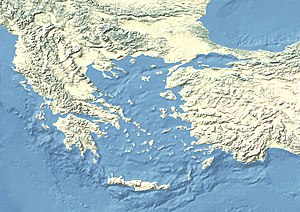| Battle of Arginusae | |||||||
|---|---|---|---|---|---|---|---|
| Part of the Peloponnesian War | |||||||
| |||||||
| Belligerents | |||||||
| Sparta | Athens | ||||||
| Commanders and leaders | |||||||
| Callicratidas † |
8 co-equal strategoi:
| ||||||
| Strength | |||||||
| 120 ships | 155 ships | ||||||
| Casualties and losses | |||||||
| 70 ships | 25 ships | ||||||
Location of the Battle of Arginusae | |||||||
The Battle of Arginusae took place in 406 BC during the Peloponnesian War near the city of Canae in the Arginusae Islands, east of the island of Lesbos. In the battle, an Athenian fleet commanded by eight strategoi defeated a Spartan fleet under Callicratidas. The battle was precipitated by a Spartan victory, which led to the Athenian fleet under Conon being blockaded at Mytilene. To relieve Conon, the Athenians assembled a scratch force composed largely of newly-constructed ships manned by inexperienced crews. The inexperienced fleet was thus tactically inferior to the Spartans, but its commanders circumvented the problem by employing new and unorthodox tactics, which allowed the Athenians to secure a dramatic and unexpected victory. Slaves and metics who participated in the battle may have been granted Athenian citizenship.
The news of the victory itself was met with jubilation at Athens. Their joy was tempered, however, by the aftermath of the battle, in which a storm prevented the ships assigned to rescue the survivors of the 25 disabled or sunken Athenian triremes from performing their duties, and a great number of sailors drowned. A fury erupted at Athens when the public learned of that, and a bitter struggle occurred after which the assembly tried and executed as a group six of the eight commanding generals.
At Sparta, meanwhile, traditionalists who had supported Callicratidas pressed for peace with Athens since they knew that a continuation of the war would lead to the reascendence of their opponent Lysander. The party initially prevailed, and a delegation was dispatched to Athens to make an offer of peace. The Athenians, however, rejected the offer, and Lysander departed to the Aegean to take command of the fleet for the remainder of the war, which would be decided less than a year later by his total victory at the Battle of Aegospotami.
